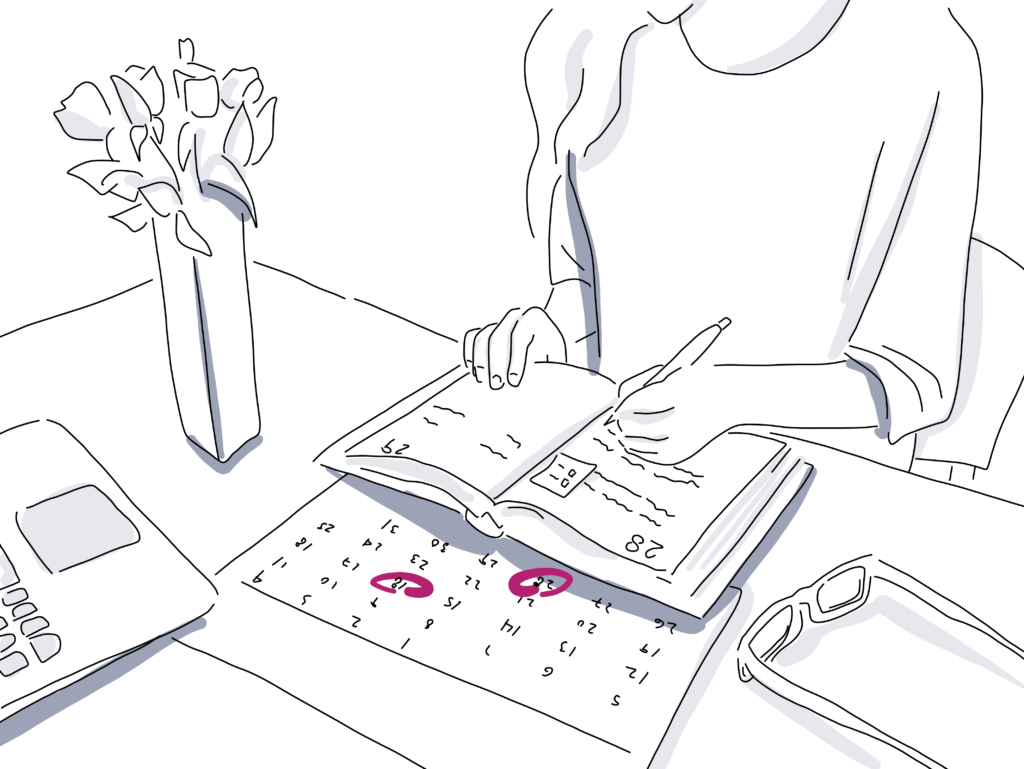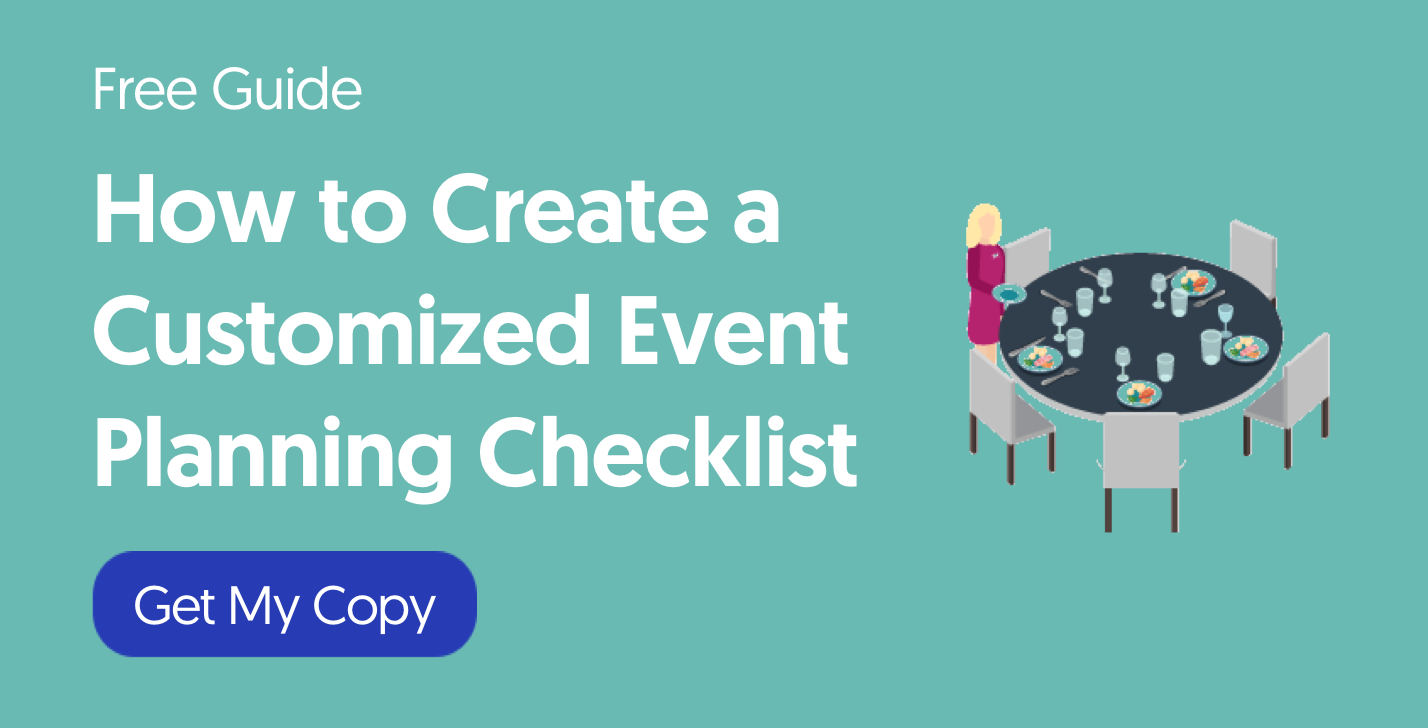
Tips Tuesday: 16 Sanity-Saving Mental Health Ideas for Event Planners
You’ve probably already heard that event planning is the 5th most stressful job in the world. Which means that mental health should be a top priority for every event planner, no matter where they are in their career. Here are some helpful and creative ways to keep it all together before, during, and after the big event.
Explore Top Mental Health Tips for Event Planners
1. Have a personal back up to cover you when you need to eat or sit down at events.
Labor laws are put in place to protect the health and well being of events workers, which includes you. And while rest and mental health break requirements vary by state, the minimum recommended amount of time a person is required to rest during extended work periods is an uninterrupted 30 minute lunch break with at least one 10 minute rest period if you’re working more than 6 hours at a time.
In order to take this time off during a hectic event, you’ll need to assign a volunteer or colleague to the task. Be sure to schedule it as part of your personal event agenda (hint: look for programming lulls where your immediate help isn’t needed and attendees will be resting or looking around).
2. Outsource the parts of your to do list that don’t require your skill set.
You can either delegate these duties to someone on your team or use one of many freelance outsourcing websites like Upwork, Fiverr, and 99Designs. The key is to find tasks that are time consuming, can be completed by almost anyone regardless of their event experience, and fits within your budget.
For example, you might have some of these super outsource friendly items on your list:
- Writing thank you notes to event donors and sponsors
- Picking up event signage from the printer across town
- CRM or attendee contact list clean up (making fields and data more uniform, double checking emails are up to date, etc.)
- Drafting legal contracts for vendors and event partners
- Sourcing a list of viable volunteer or staffing agencies near your chosen venue
3. Start every project by creating a written project agreement with your client or team.
Yes, you need an event planning contract. But if you want to save some hair pulling down the road you better have a project agreement in place too. What’s the difference? A contract is a legally binding document that takes care of financial and practical event details at a high level. An agreement gets everyone on the same page about the nitty gritty, day to day considerations.
Include sections that clearly define everyone’s roles and responsibilities, the communication methods you’ll use and how frequently you expect to contact (or be contacted by) collaborators, and what expectations you have for each team member for before, during, and after the event takes place.
4. Plan for at least one full recovery day after live events.
Studies show that work-induced fatigue compounds over time. And if you’re pulling multiple 12 hours shifts in a row at a trade show or convention, there are many serious mental health, physical health, safety, and even economic consequences. So do yourself a favor and block out those 24 hours post event for some rest and relaxation.
5. Conduct a 5 minute personal check-in every morning.
Ask yourself how you are feeling, what needs are or are not being met currently, and if there’s anything on your mind that might get in the way of work. Habits like these are easier to implement and maintain if you link them to an already established routine. So prop your journal up next to your coffee maker or set a calendar reminder for when you first sit down to check your email in the morning.
6. Build a network of vendors and partners that see events as a collaboration, not just another job.
A great event leader needs a great team. If you have collaborators who are emotionally invested in your project, you’ll receive better support on event days and more professional behavior overall (which means no behind the scenes drama or big personalities to manage).
In fact, when Google set out to create the perfect team, they shocked researchers when they discovered that social leadership and a sense of joy in the work played key roles in building dependable groups.
7. Add self-awareness practices into your daily routine.
Self-awareness is a largely undervalued soft skill that could work wonders for managing on the job stress as well as your overall mental health. The benefits include silencing that pesky inner critic, getting a better perspective (which helps with decision making skills when under pressure) and burnout prevention.
Here are some self-awareness exercises to get you started:
- Compare and contrast the facts of any upsetting or frustrating event with the personal belief that generated your response. For example, you might feel angry when a client doesn’t respond to your emails within your (unspoken) timeline. The event itself is irrelevant to your chosen reaction. Reflect and consider whether or not that person’s action was meant to cause you harm or, if you’ve chosen to believe this, create unnecessary chaos or setbacks.
- Consider what you want someone to put in your obituary. Morbid, yes, but highly effective as you consider what your big picture goals in life really are. Then see how your current, daily actions and habits are driving you toward or away from those goals.
- Learn how to label your feelings. Emotions are tools our mind uses to communicate messages to the body. When left unchecked, they can create serious physical health issues. So when a feeling comes up, take a minute to acknowledge it, name what it is, and consider if it’s helpful to you in this moment.
8. Write positive affirmations before and after nerve wracking meetings.
Active, I statements that use positive wording always work best. Here are some of our favorites:
- I deserve respect and admiration for what I have accomplished so far in my event planning career.
- I become a better event planner each and every day.
- My event planning clients love and appreciate the work I do for them.
- I know what my skills are worth and my event partners are happy to compensate me accordingly.
- I am open to receiving success and abundance from my event planning efforts.
9. Join a support group or social club for fellow event planners.
Medical News Today endorses socialization as a way to improve both physical and mental health. Signing up for (or creating your own) community of event planning peers is proven to help individuals destress, get a new perspective on their work, and develop healthier habits in other areas of their life. Use any one of these great event planner networking tips to get started.
10. Make sure you receive high quality sleep if quantity isn’t an option.
Even if you can’t get a full 8 hours in, you can make the most of the time you do have by using any one of these tactics:
- Stop looking at screens at least one hour before bed. But if you absolutely must, try an authentic pair of blue light blocking glasses to do so.
- Keep a regular sleep schedule. We hear this advice a lot but what it really means is that you go to bed and get up within the exact same time (or less than 30 minutes of that time) every day. And yes, that also means on the weekends.
- If you’re too wired to actually fall asleep, use one of these proven relaxation techniques to make the most of your downtime.

11. Celebrate Event Wellbeing Week.
Hosted by EventWell (the #1 Eventprofs resource for wellbeing advice), the official Event Wellbeing Week kicks off September 16th. During this time they’ll offer some live events in London but you can also join the fun online.
12. Talk to a therapist on the go.
It’s 2019 and you can now talk to your therapist while you’re commuting to work, in between meetings, and while you’re on your sofa at home. Apps like TalkSpace and BetterHelp (for texting), or LARKR for those who want to video chat with a licensed therapist. By the way, you don’t need insurance to use most of them and they all offer free or affordable options.
13. Keep up with chores by using apps.
For those weeks when you’re just too exhausted to do anything but work and sleep, you need to outsource your home to do list. This is especially true if you’re one of those people who need to keep your home office or general space clean in order to feel relaxed and productive. You can easily handle your weekly chores with one of these great resources:
- Laundry: iClean & Cleanly
- Grocery Shopping: InstaCart & Amazon Fresh
- House Cleaning: Handy & Clean My House
- Car Washing: MobileWash & Spiffy
- Errand Running: TaskRabbit & Favor Delivery
14. Automate or templatize routine event planning tasks.
The best way to do both at the same time is to adopt a great event management software that can help you create a repeatable process, maximize your event ROI, and review data to find new areas for improvements.
15. Use designated sick days to take care of your mental health.
Mental health is a totally valid reason for taking a day off of work and more and more great employers are celebrating the employees who do. Even if you own your own business, taking a mental health day will be a great example of personal care to those who work with or for you. It’ll also help destigmatize mental health concerns in the workplace. So if you’re going to take a mental health day, here are some things planners need to know.
16. Learn more about mental health through these great resources.
These amazing tools can help you take control of your mental health and gain better coping mechanisms that will pay off for the rest of your career. Check out any one of these top mental health books, podcasts, YouTube channels, apps, and online courses. Just pick your favorite education tool and start with the first list item that interests you!
Now you can find more even more healthy ways to manage event planning stress!
If you’re looking to prevent burnout, don’t be afraid to ask for help. Whether that means using a suggestion form this list, getting some more event planning inspiration when you’re out of ideas, or simply reorganizing your calendar to make it more manageable, there will always be a way to do great work while preserving your mental health.

